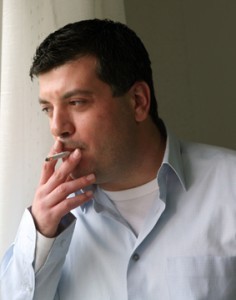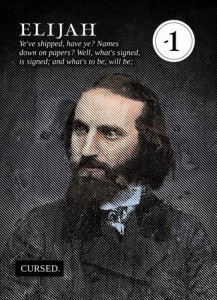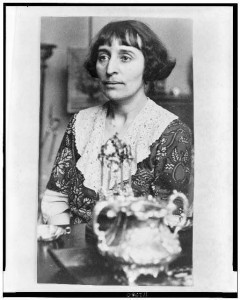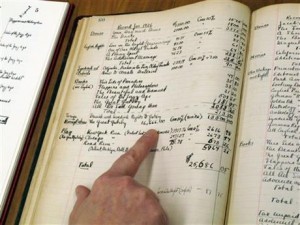The Paris Review's Blog, page 825
May 1, 2013
Bull City Summer: How William Eggleston Would Photograph a Baseball Game
Photo: Leah Sobsey
I am at war with the obvious. —William Eggleston
Not long ago, I wrote about the formal and spiritual affinities between baseball and the genre of music called power pop. Both observe an “unwavering, repetitive adherence to form” while pushing hard against strict, self-imposed formal limits, thus “mak[ing] music out of a very precise, narrow, angular geometry.”
Then, on April 8, the day before the Durham Bulls’ inaugural home game of the season, Bull City Summer’s first guest photographer, Alec Soth, gave a talk at the North Carolina Museum of Art, where his show “Wanderlust” is currently on view. He began by showing a slide, not of his own work, but of Flowers for Lucia by the photographer William Eggleston. Eggleston “hangs over me,” Soth confessed, before showing a picture he made of Eggleston himself.
These disparate elements—power pop and Eggleston—came together for me just a few hours after Soth’s talk, when the documentary film, Big Star: Nothing Can Hurt Me, about the seminal power-pop band, closed Durham’s annual Full Frame Documentary Film Festival. (Eggleston appears in the documentary, so ravaged and slurred by years of hard living that the filmmakers resort to subtitling their interview with him in order to make him intelligible.) To make a nakedly baseball-centric comparison, you could say that Big Star was a can’t-miss major-league prospect that somehow missed: led by the late Alex Chilton, the band should have found international fame but barely got out of Memphis, the Triple-A city it called home. Read More »
The Funnies, Part 3
How to Win at Moby-Dick, and Other News
Moby-Dick: Or, the Card Game takes to Kickstarter.
Related: Emoji Dick.
Rules for literati. “These rules can be summed up with the overarching theme of Act Like a Normal Person.”
How to procrastinate, Kafka-style.
Braveheart, and other movies based on poems.
April 30, 2013
Business as Usual
Well-known businesswoman Alice B. Toklas.
Much has been made in recent days of Wikipedia’s decision to place certain authors under the rubric “American Women Novelists,” rather than merely “American Novelists”—the sort of thing which, in my retail days, I might have referred to as “a strong choice.”
Perhaps less controversial, but I would argue just as peculiar, is their designation of a lady who would today have been 136. In the alphabetized list of notable birthdays for April 30 one may find the following: “Alice B. Toklas, American businesswoman.”
Falling Men: On Don DeLillo and Terror
Some terrorist attacks become cultural obsessions, while others are forgotten completely. There were three bombings in New York City in 1975, none of which I’ve ever heard talked about, each of which would probably shut down the city if it happened now. In January, Puerto Rican separatists set off dynamite in Fraunces Tavern in downtown Manhattan, killing four businessmen—the same number of fatalities, incidentally, that led us to close the airspace over Boston last week. In April, four separate bombs went off in midtown Manhattan on one afternoon, damaging a diner and the offices of several finance firms. The worst one came in late December, when a package of dynamite exploded in the baggage-claim area at LaGuardia Airport, killing eleven.
These were underground disturbances, moments of disorder that helped warp the culture, even if they weren’t absorbed or even remembered. In 1975, Don DeLillo was thirty-nine, living in the city, possibly beginning work on Players, his fifth novel and his first about terrorism. Long before it became obvious, DeLillo argued that terrorists and gunmen have rearranged our sense of reality. He has become better appreciated as the world has come to resemble his work, incrementally, with every new telegenic catastrophe, every bombing and mass shooting. Throughout DeLillo’s work we encounter young men who plot violence to escape the plotlessness of their own lives. He has done more than any writer since Dostoevsky to explain them. Read More »
The Funnies, Part 2
Fitzgerald’s Bookkeeping, and Other News
“This is a record of everything Fitzgerald wrote, and what he did with it, in his own hand.” The University of South Carolina makes F. Scott’s financial ledger available on the Internet. (“Just weeks before the opening of the movie The Great Gatsby,” the AP adds, horribly.)
In news that carries the ring of inevitability, Steven Soderbergh is writing a crime novella on Twitter.
“It’s pretty graphic, and it’s pretty pornographic for seventh-grade boys and girls to be reading,” says one concerned mother, about … Anne Frank’s diary.
Haruki Murakami is set to make his first public appearance in Japan since 1995.
A. A. Milne’s WWI propaganda career comes to light.
April 29, 2013
Adieu White Street, Bonjour High Line
It’s the end of an era here at The Paris Review: after eight years in TriBeCa, today we’re packing up and heading north to our new Twenty-Seventh Street digs. While it’s bittersweet, we look forward to making new memories in Chelsea. And, yes, the birds are migrating with us.
As of this afternoon, you can find us at 544 West 27th Street, New York, New York 10001. That’s past the High Line, across the street from the strip club, and next door to the Cuban restaurant. If you fall into the river, you’ve gone too far.
The Born Identity: An Interview with Sayed Kashua
 My Skype chat with Arab Israeli author Sayed Kashua started off on a promising note when we bonded over our ineptitude for all things mathematical. Except he, in typical fashion, was being facetious, while I had tried in vain to figure out Israeli time zones. The author—who also happens to be a columnist for the newspaper Ha’aretz and the writer of the popular Israeli-aired TV show Arab Labor—has an intimate relationship with the complexity of what it means to be an enigma in Israeli society. His most recent novel, Second Person Singular, is a delicately interwoven narrative, stitched together by instances of jealously, raw relationships, and the deeply embedded dogma of identity. Sayed’s cautionary tale doesn’t presume an intimate familiarity with the intractable Gordian Knot of Israeli society in order to understand human nature, willful dignity, and self-destructive tendencies. And therein lies the point.
My Skype chat with Arab Israeli author Sayed Kashua started off on a promising note when we bonded over our ineptitude for all things mathematical. Except he, in typical fashion, was being facetious, while I had tried in vain to figure out Israeli time zones. The author—who also happens to be a columnist for the newspaper Ha’aretz and the writer of the popular Israeli-aired TV show Arab Labor—has an intimate relationship with the complexity of what it means to be an enigma in Israeli society. His most recent novel, Second Person Singular, is a delicately interwoven narrative, stitched together by instances of jealously, raw relationships, and the deeply embedded dogma of identity. Sayed’s cautionary tale doesn’t presume an intimate familiarity with the intractable Gordian Knot of Israeli society in order to understand human nature, willful dignity, and self-destructive tendencies. And therein lies the point.
I caught up with Kashua over the audible sounds of his young children shrieking in the background, and we spoke about the paradoxes of being an Arab Israeli columnist who lives in a prominently Jewish neighborhood, and whose daughter shares a schoolyard with the Israeli Prime Minister’s son.
I was just playing with my little boy.
How old is he?
I don’t know exactly…
I think maybe we’re both equally bad at math.
No, no, he is a year and eight months.
Just me then. You just came back from a book tour, which you’ve capped off by saying you want both sides to go to hell. So it sounds like it went well. Did you learn anything new in the interim?
Yes, that the real Jewish state is the Upper West Bank, in New York, and that Montreal can be very cold. I don’t know what I learned this time around, because it’s not my first time, but I think that this feeling that I can run away from dealing with identity, or not to feel like a persecuted minority will not go away if I move to Canada or the U.S. Because most people I met were dealing with issues of identity, language, belonging, and what does home mean. But most of the people that I met were Israeli, or Arab, or Palestinians. I think that identity doesn’t deserve so much thinking, to be honest. I think [from the tour] I have earned my confusion in a very honest way. Being a Palestinian citizen of Israel, it’s okay. We can be confused. I hear criticisms from both sides, but the majority of both sides really listen and like my work, so the tour was great.
The Funnies
The Paris Review's Blog
- The Paris Review's profile
- 305 followers












